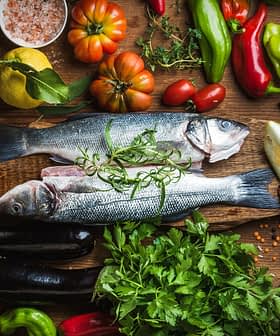Dietary Fiber Linked to Lower Risk of Heart Disease and Cancer
Consuming a minimum of 25 to 29 grams of fiber from Mediterranean diet plant foods is significantly tied to better health and longevity, including a lower the risk of diabetes.
A study published in The Lancet found that a high consumption of fiber-rich foods, such as fruits, vegetables, beans, and whole grains, offers protection from non-communicable diseases like heart disease, diabetes, and colorectal cancer. Results showed that consuming at least 25 to 29 grams of dietary fiber per day was associated with a 15 to 30 percent reduction in death rate from cardiovascular disease and all causes, as well as a decreased incidence of stroke, coronary heart disease, colorectal cancer, and Type 2 diabetes.
A study found that a high consumption of fiber-rich foods, which are staples of the Mediterranean diet, offers protection from non-communicable diseases.
The fiber content of fruits, vegetables, beans and whole grains appears to reduce the death rate from heart disease, diabetes and colorectal cancer.
The dose-response relationship between dietary fiber and protection against a number of important diseases suggests that fiber itself is a very important factor contributing to the protection
“Our findings provide convincing evidence for nutrition guidelines to focus on increasing dietary fiber and on replacing refined grains with whole grains,” Professor Jim Mann, the author of the study from the University of Otago in New Zealand, said. “This reduces incidence risk and mortality from a broad range of important diseases.”
See Also:Olive Oil Health BenefitsThe review, published in The Lancet, examined data from 58 clinical trials involving 4,635 participants, as well as 185 observational studies that related to 135 million person years. Researchers looked at the incidence of and the death rate from cardiovascular disease, coronary heart disease and stroke, along with Type 2 diabetes and various cancers tied to obesity. The clinical trials and studies spanned nearly 40 years.
Results revealed the advantages of eating at least 25 to 29 grams of dietary fiber per day. The highest fiber intakes were associated with a 15 to 30 percent reduction in death rate from cardiovascular disease and all causes, compared to the lowest fiber intake.
Consumption of fiber-rich foods was also tied to a 16 to 24 percent decreased incidence of stroke, coronary heart disease, colorectal cancer and Type 2 diabetes. In addition, higher fiber intake was linked to healthier cholesterol and body weight, compared to lower fiber intakes.
Every 8‑gram increase of daily dietary fiber consumption was connected with a five to 27 percent reduction in the incidence of and death rate from coronary heart disease, colorectal cancer and Type 2 diabetes. Protection from stroke and breast cancer also rose. While consuming 25 to 29 grams daily was sufficient, the data indicated that a higher intake would offer even more protection.
Each 15-gram increase of daily dietary whole grains was connected to a two to 19 percent decline in the incidence of and death rate from coronary heart disease, colorectal cancer and Type 2 diabetes. Higher consumption of whole grains was tied to a 13 to 33 percent decrease in non-communicable disease risk. Whole grains consumption was also linked to a lower body weight.
The World Health Organization commissioned the study to guide the development of new dietary fiber recommendations for optimal health. Another goal of the study was to identify what types of carbohydrates provide the most protection from weight gain and non-communicable diseases.
Most people around the world consume considerably less fiber than what health experts advise. In 2015, the U.K. Scientific Advisory Committee on Nutrition advocated raising the recommended dietary fiber intake to 30 grams per day; however, a mere nine percent of U.K. adults consume this amount. Fiber intake in the U.S. is also lacking, as the average adult intake is 15 grams per day.
“The health benefits of fiber are supported by over 100 years of research into its chemistry, physical properties, physiology and effects on metabolism,” Mann said. “Fiber-rich whole foods that require chewing and retain much of their structure in the gut increase satiety and help weight control and can favorably influence lipid and glucose levels. The breakdown of fiber in the large bowel by the resident bacteria has additional wide-ranging effects including protection from colorectal cancer.”
High-fiber foods are plentiful in a host of phytonutrients that support health, a fact that begs the question: how much of the benefits found in the study are due to fiber, and how much are due to phytonutrients? Mann told Olive Oil Times that while the nutrient-dense foods are extremely healthful, fiber produces positive wellness effects independent of the other constituents.
“Of course you are correct in suggesting that fiber-rich foods are high in a number of other potentially protective constituents,” he said. “However, the dose-response relationship between dietary fiber and protection against a number of important diseases suggests that fiber itself is a very important factor contributing to the protection.”









